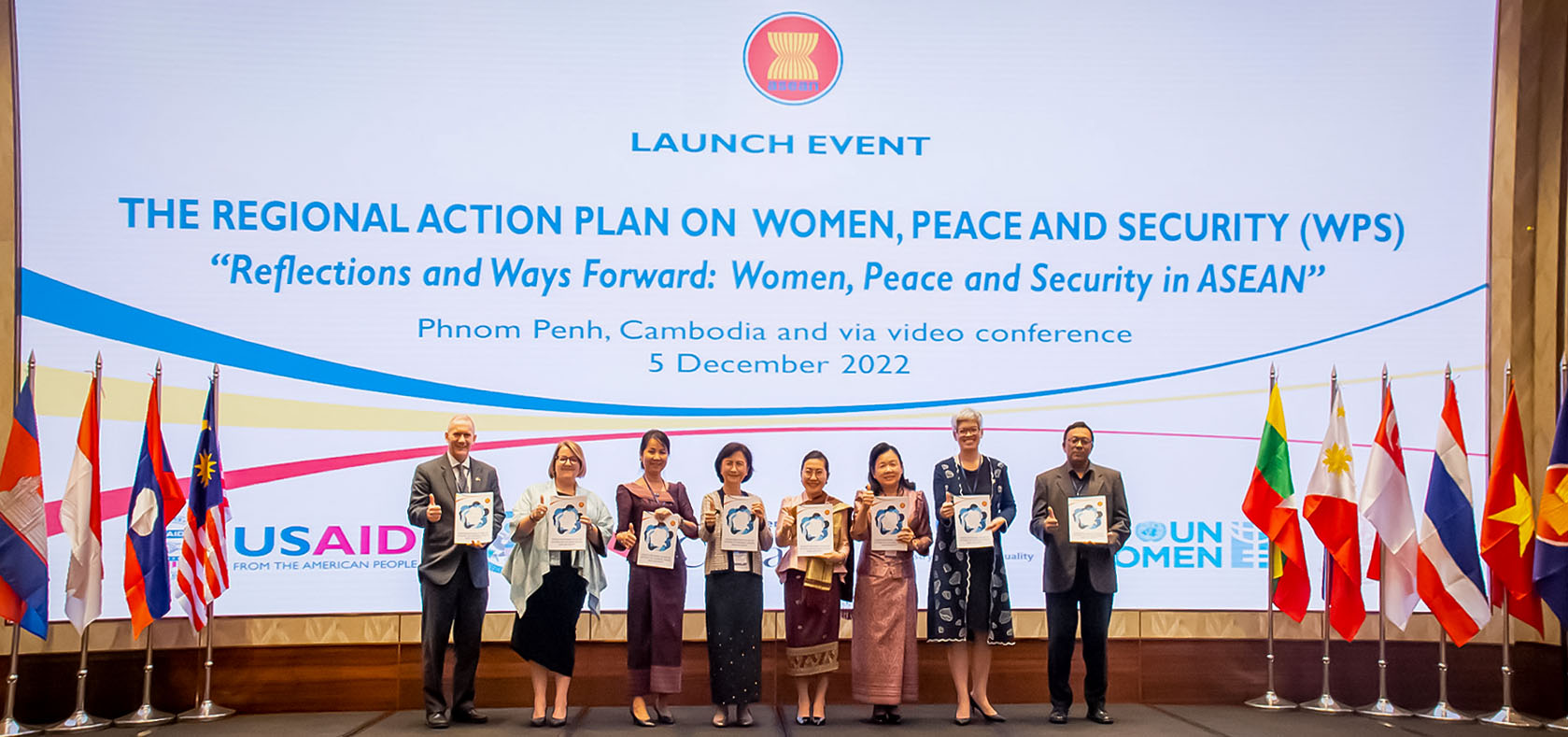ASEAN launches plan to promote women’s security in Southeast Asia
Date:

Phnom Penh, Cambodia — Today, the Association of Southeast Asian Nations (ASEAN), in partnership with the U.S. Agency for International Development (USAID) and UN Women, launched the ASEAN Regional Plan of Action on Women, Peace and Security (ASEAN RPA on WPS).
The regional plan of action was adopted by the ASEAN Leaders during the 40th and 41st ASEAN Summits in November 2022 as a key deliverable during the term of Cambodia as ASEAN Chair. It outlines ways to implement the four main pillars of the women, peace and security agenda – women’s protection, participation, prevention, and relief and recovery – along with implementation, coordination, reporting, and monitoring and evaluation. It is meant to advance commitments to the women’s peace and security agenda and turn them into action.
H.E. Dr. Ing Kantha Phavi, Minister of Women’s Affairs of Cambodia, said “the development of the ASEAN RPA on WPS is a major step forward to fulfill ASEAN's vision in achieving gender equality. Promoting women’s roles and participation across all realms of peace and security ranging from conflict prevention, peace building, preventing violent extremism and tackling emerging security risks such as disaster and pandemics in the region is imperative to reach our goal as inclusive and people-centered Community. ASEAN is committed to continue to forge ahead with advancing WPS agenda and the ASEAN RPA on WPS will guide our ways."
The regional plan of action is a major step forward in ASEAN’s efforts to ensure that its ten Member States recognise and leverage women’s participation and leadership in preventing conflict and building and in maintaining peace in the region. Previous efforts include the Joint Statement on Promoting Women, Peace and Security in 2017; the launch of ASEAN Women for Peace Registry in 2018; and the ASEAN Regional Study on Women, Peace and Security in 2021. All three milestones were supported by USAID and UN Women.
“The U.S. government looks forward to continuing our collaboration with ASEAN, other dialogue friends, and development partners to promote and strengthen the crucial role of women’s participation in fostering regional peace and security,” stated U.S. Ambassador to ASEAN Yohannes A. Abraham.
He added, “Building on the USAID Administrator’s leadership co-chairing the inaugural ASEAN-U.S. Ministerial meeting on Gender Equality and Women's Empowerment, our partnership with ASEAN deepens with the first-ever Regional Plan of Action on Women, Peace and Security. It represents an important milestone to ensure women are key agents of change to catalyze peacebuilding, conflict prevention, and recovery in the region. It also marks a necessary step for implementing national-level action plans to expand and strengthen women’s involvement at the policy-making table for peace and security issues.”
Sarah Knibbs, Regional Director a.i. of UN Women Asia and the Pacific, said “The Women, Peace and Security agenda was founded with a simple but transformative idea that peace is fundamentally linked to equality between women and men. The ASEAN Regional Plan of Action on WPS provides a critical framework for realizing a more inclusive and sustainable peace in this region and a starting point to mainstream WPS into peace and security decision-making in the region, including peacekeeping operations and increasing non-traditional security threats that risk undermining peace and security of this region.”
For her part, Vicky Singmin, Chargé d’affaires of the Mission of Canada to ASEAN said, “The Women, Peace and Security agenda is a shared priority for Canada and ASEAN, and it is a core element of Canada’s Feminist International Assistance Policy to achieve sustainable global peace and reducing inequality. Canada is pleased that our support has contributed to the development of this historic Regional Plan of Action, and with it, helped open the doors for women peacebuilders in the region. Building on this momentum, Canada will host a Jakarta-based series of WPS Dialogues with ASEAN in 2023, which will provide a platform for discussions on the implementation of the WPS agenda and other priorities, such as enhancing the role of women in political leadership.”
The launch event called for ASEAN Member States to commit to effectively implementing the ASEAN RPA on WPS. In addition, an ASEAN Women, Peace and Security website was launched to promote the agenda.
The ASEAN Committee on Women (ACW) and the ASEAN Commission on the Promotion and Protection of the Rights of Women and Children (ACWC) spearheaded the development of the ASEAN RPA on WPS with the support of the ASEAN Women, Peace and Security Advisory Group led by Cambodia; the ASEAN-USAID Partnership for Regional Optimization within the Political-Security and Socio-Cultural Communities (PROSPECT) project; and UN Women’s Empowering Women for Sustainable Peace project, funded by the Governments of Canada and the Republic of Korea.
For additional information:
USAID/ASEAN Communications Specialist, Samara Sanders: [ Click to reveal ]
UN Women Communications Officer, Yoomi Jun: [ Click to reveal ]
About ASEAN
ASEAN, founded on 8 August 1967, comprises Brunei Darussalam, Cambodia, Indonesia, Lao People’s Democratic Republic, Malaysia, Myanmar, Philippines, Singapore, Thailand and Viet Nam. On 31 December 2015, the ASEAN Community was formally established. The ASEAN Secretariat is based in Jakarta, Indonesia.
About USAID
As part of the U.S. strategic approach to the Indo-Pacific, USAID works to promote and demonstrate democratic values and advance a free, open, resilient, connected, prosperous, and secure world through international development programs and humanitarian assistance. Through a five-year, $50 million Regional Development Cooperation Agreement, USAID partners with ASEAN to mitigate regional challenges, improve economic growth and integration, and strengthen rule of law to shape policies that influence national sectoral approaches.
About UN Women
UN Women is the United Nations entity dedicated to gender equality and the empowerment of women. UN Women supports UN Member States as they set global standards for achieving gender equality and works with governments and civil society to design laws, policies, programs and services needed to ensure that the standards are effectively implemented and truly benefit women and girls worldwide.